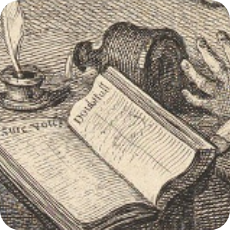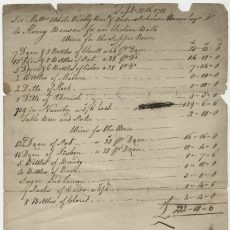Oct
1774
newcastle upon tyne
Contested
GENERAL ELECTION
Poll book data from:
Citation: The poll at the election… (Newcastle: T. Saint, 1774)
Source: John Sims (ed.), A Handlist of British Parliamentary Poll Books (Leicester, 1984); Jeremy Gibson and Colin Rogers (eds.), Poll Books, 1696–1872: A Directory of Holdings in Great Britain (4th edn., Bury, 2008); L. W. L. Edwards (ed.), Catalogue of Directories and Poll Books in the Possession of the Society of Genealogists (4th edn., 1984).
Timeline & Key Statistics
Contexts & Remarks
Dates: Tuesday 11 Oct.-Wednesday 19 Oct. 1774.
Poll book reference: The burgesses' poll at the late election... (2nd edn., corrected, Newcastle: printed for the editor, 1775).
The poll book is prefaced a summary of the disputes and agreements reached between the candidates over how to regulate the poll. A copy held at the British Library includes manuscript notes on Newcastle's districts.
Candidates: Sir Walter Calverley Blackett (Tory); Sir Matthew White Ridley (Whig): Constantine John Phipps (Radical): and Thomas Delaval (Opposition).
Walter Blackett had been elected for Newcastle in 1734. Walter Blackett was the son of Sir Walter Calverley, a rebel who had fled the country after having been involved in the 1715 Jacobite uprising. Blackett's great-grandfather, grandfather, and uncle had all served as MPs for the borough.
Sir Matthew White Ridley was the son of Matthew Ridley, who had served as mayor of Newcastle and had been unopposed as MP for Newcastle from 1747 to 1774. He was a significant landowner in Northumberland, who owned the Plessey collieries and Blyth's quay and was involved in local glassworks.
Constantine Phipps, a member of the Royal Navy, stood for the radical interest in Newcastle, having previously supported the Opposition. During the campaign, Phipps, 'declared his warmest attachment to the best interests of Newcastle, and especially to the improvement of the River Tyne', and promised to 'exert all his influence with the Admiralty, to whom he was personally known, to protect, cherish and aggrandize the important and numerous branches of trade on the river' (Namier, Structure, 95-99).
Thomas Delaval was likely connected to the Delavals of Ford Castle, a family which served as MPs for Hindon, Andover, and Berwick-upon-Tweed, and Knights of the Shire for Northumberland.
Supporters of the incumbents, Blackett and Ridley, typically stemmed from the merchants, hostmen, and goldsmiths, whereas those in the building trade tended to support their opponents.
The election returned Blackett and Ridley.
Cultural Artefacts
Poll Book
Below is a digitised version of the poll book for this election:




